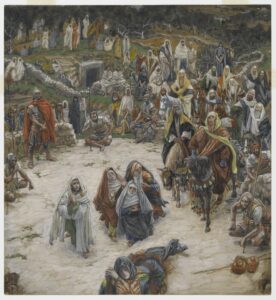2 John 1:4: “I rejoiced greatly to find some of your children walking in the truth, just as we were commanded by the Father.”
The books of the New Testament are essentially letters either to individuals or to churches. Yet, we’re often content with fragments, like “judge not” or “I can do all things.” In fact, many have never read an entire book of the Bible. Consequently, we miss out on its rich heritage and spiritual significance.
In light of this, I thought it helpful to read an entire book of the Bible – 2nd John. Granted, this is a short book, but it is a whole letter written to an individual and will yield a sense of how a complete book of the Bible flows.
2 John 1-13 ESV:
1 “The elder to the elect lady and her children, whom I love in truth, and not only I, but also all who know the truth, 2 because of the truth that abides in us and will be with us forever:
One of the twelve apostles, John, the Elder or Pastor, writes this letter to an unknown lady who is a believer from one of the congregations with which John is acquainted. John is also the author of the Gospel of John, 1st and 3rd John, and the book of Revelation. He is often referred to as “the beloved” because of John 13:23, which declares, “One of his disciples, whom Jesus loved…” It should be noted, however, that the term beloved is used both of Christ and of His elect believers. For example, Colossians 3:12 states, “Put on then, as God’s chosen ones, holy and beloved…” It is also known that John was the only apostle who didn’t die a martyr’s death, that he, Mary, and a few other women were the only ones at the foot of the cross when Jesus was crucified, and that Christ entrusted Mary to John’s care.
Notice the repeated use of the word “truth” – “I love in truth,” “all who know the truth,” and “the truth that abides in us.” In John 14:6, Christ identifies Himself as “the truth” when He declares, “…I am the way, and the truth, and the life…” This, then, shows the close connection of Christ as “the truth” with those who have faith in Him. It may also be the antithesis of the “untruths” of deceivers, which is the topic later in this particular book.
3 Grace, mercy, and peace will be with us, from God the Father and from Jesus Christ the Father’s Son, in truth and love.
“Grace, mercy, and peace” is simply a greeting that indicates with God’s grace and through His mercy, there finally is peace. Paul, in 1st and 2nd Timothy, uses the same greeting. You may also note that he greets as representing the “Father” and the “Son.” Although the word “Trinity” never appears in the Bible, there are frequent references to the Father, Son, and Holy Spirit in various books. Here, the Father and Son are mentioned.
4 I rejoiced greatly to find some of your children walking in the truth, just as we were commanded by the Father.
The modes of communication during the time of John were nowhere near ours, but John had received accounts from wandering Christians of the church and its members to which the woman of this letter belonged. As is usual in most of the New Testament letters, all is not perfect. Even in the Book of Revelation, in which Jesus addresses seven churches, most are rebuked for their lack of love and outright sin. It is no wonder that many of the churches of today are lost. John, nonetheless, rejoices in those who are “walking in truth.
5 And now I ask you, dear lady—not as though I were writing you a new commandment, but the one we have had from the beginning—that we love one another. 6 And this is love, that we walk according to his commandments; this is the commandment, just as you have heard from the beginning, so that you should walk in it.
The commandment John refers to what is called the Shema, which is detailed in the Gospel of Matthew 22:35-40 as follows, “…a lawyer, asked Him [Jesus] a question to test him. ‘Teacher, which is the great commandment in the Law?’ And he said to him, ‘You shall love the Lord your God with all your heart and with all your soul and with all your mind. This is the great and first commandment. And a second is like it: You shall love your neighbor as yourself. On these two commandments depend all the Law and the Prophets.’”
But John, through the Holy Spirit, goes even further and ties in obedience to love; “that we walk according to His commandments…” Here, John completes the belief of verse 4, “walking in truth,” in that truth characterizes obedience
7 For many deceivers have gone out into the world, those who do not confess the coming of Jesus Christ in the flesh. Such a one is the deceiver and the antichrist. 8 Watch yourselves, so that you may not lose what we have worked for, but may win a full reward. 9 Everyone who goes on ahead and does not abide in the teaching of Christ does not have God. Whoever abides in the teaching has both the Father and the Son. 10 If anyone comes to you and does not bring this teaching, do not receive him into your house or give him any greeting, 11 for whoever greets him takes part in his wicked works.
A common problem, even in the first century, was false teachers and prophets. This problem is prevalent today. Many religions deny the incarnation of Jesus Christ, that God the Son came to earth, in the flesh, as fully God and fully man. Here, John is warning that those who deny this incarnation are, in fact, antichrists. He emphasizes that those who do “not abide in the teaching of Christ [do] not have God.”
The Bible affirms that salvation is permanent. Notice that verse 8 states, “…so that you may not lose what we have worked for, but may win a full reward.” 1 Corinthians 3:15 states, “If anyone’s work is burned up, he will suffer loss, though he himself will be saved, but only as through fire.” This is related to Matthew 6:19-20 which promises, “…lay up for yourselves treasures in heaven, where neither moth nor rust destroys and where thieves do not break in and steal.” God promises that our good deeds will be rewarded, but the lack of good deeds will result in a lack of rewards. Ultimately, no one will lose their salvation as that is assured by the Holy Spirit, which is conveyed in Ephesians 1:13-14, where it promises, “In Him you also, when you heard the word of truth, the gospel of your salvation, and believed in him, were sealed with the promised Holy Spirit…”
But John does give a crucial warning here, a caution that too many churches dismiss; “If anyone comes to you and does not bring this teaching, do not receive him into your house or give him any greeting, 11 for whoever greets him takes part in his wicked works.” Today, many churches allow the music of popular false churches, such as Hillstone, Elevation, and Bethel, or the books and seminars of popular false teachers, like those associated with Lifeway, in total disregard of this verse. These false teachings should be completely banned along with their music, books, and lectures, for to do otherwise, we “take part in [their] wicked works.” As the books of Mark, Luke, and Revelation state, “He who has ears to hear, let him hear.”
12 Though I have much to write to you, I would rather not use paper and ink. Instead, I hope to come to you and talk face to face, so that our joy may be complete. 13 The children of your elect sister greet you.”
John ends this short epistle, his letter, with a personal note and greeting.
And there you have it: one complete book of the Bible, perhaps the first many have ever read. Granted, it’s shorter than most of the books in the Bible, but it is unmistakably a very personal and intimate letter with a strong note of caution against false teachings. A warning, again, often ignored. It also ties love with walking in truth, quite differently from the many weak messages where everyone is loved just as they are. Indeed, those beloved are the ones who are “walking in truth.”
Author’s Post Script
The warning in 2nd John, concerning false prophets, has both micro and macro implications.
From a micro perspective, it may be assumed that John was addressing a concern of the “elect lady” about offering hospitality. Hospitality is composed of two Greek words, “philos,” which means love, and “xenos,” which means stranger or foreigner. Essentially, with few commercial inns, believers often put themselves out to shelter and feed travelers. Here, it appears the question was whether or not to offer hospitality to those who were known not to be doctrinally accurate. Consequently, John advises that they not even be welcomed.
From a macro perspective, we are not to participate in any way in encouraging false prophets as the post above discusses.








